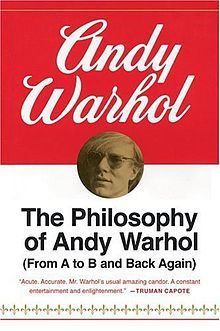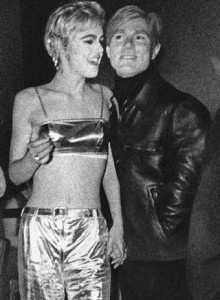 For all his masks, truth-as-quips, posturing, disingenuousness, I feel some of Andy Warhol the person comes through in this book. It’s also really funny. He outs himself as a serious sugar fiend (being rich means having money to buy candy), often refers to his burning desire to have his own TV show called “Nothing Special” (why didn’t they give that man a TV show?!). He confesses a preference for “Talkers” over “Beauties” (Talkers do, Beauties are), for bad performances over good performances (it’s impossible for bad performances to be phony), an obsession with perfumes, trapping memories through scent.. I do think his love of all things American is genuine. (Wikipedia informs: “The Philosophy was ghostwritten by Warhol’s secretary Pat Hackett and Interview magazine editor Bob Colacello. Much of the material is drawn from conversations Warhol had taped between himself and Colacello and Brigid Berlin.”)
For all his masks, truth-as-quips, posturing, disingenuousness, I feel some of Andy Warhol the person comes through in this book. It’s also really funny. He outs himself as a serious sugar fiend (being rich means having money to buy candy), often refers to his burning desire to have his own TV show called “Nothing Special” (why didn’t they give that man a TV show?!). He confesses a preference for “Talkers” over “Beauties” (Talkers do, Beauties are), for bad performances over good performances (it’s impossible for bad performances to be phony), an obsession with perfumes, trapping memories through scent.. I do think his love of all things American is genuine. (Wikipedia informs: “The Philosophy was ghostwritten by Warhol’s secretary Pat Hackett and Interview magazine editor Bob Colacello. Much of the material is drawn from conversations Warhol had taped between himself and Colacello and Brigid Berlin.”)
My favorite parts: a chapter on art, describing an heiress trying to live out her “art fantasy” with him by describing him as having taken serious risks with his art. He replies that anyone who cuts salami (for example) is taking a risk (of cutting themselves) and that she’s insulting stuntmen, babysitters, the men who landed on D-Day (etc.), because they really know what it means to take a risk, not artists. The last chapter, which describes him dragging one of his snobby young Factory employees with him to buy underwear at Macy’s is wonderful, too.
Sometimes he speaks in the poetic, and by that I mean he describes an idea centered on an image rather than on a rational, explanatory system. For example, on space:
“My ideal city would be one long Main Street with no cross streets or side streets to jam up traffic. Just one long one-way street. With one tall vertical building where everybody lived with:
One elevator
One doorman
One mailbox
One washing machine
One garbage can
One tree out front
One movie theater next door
"Main street would be very, very wide, and all you’d have to say to someone to make them feel good is, ‘I saw you on Main Street today.’
"And you’d fill you car up with gas and drive across the street.”
Etc. This isn’t meant literally. People wanted to take him literally which is why he made them angry.
There is a cold-blooded edge to parts of it, the posture is that sex and emotions are a waste of energy, which is also him being self-deprecating in a way, funny. He describes himself as having hurried along his development (dying his hair gray at age 24) so that he could have old problems instead of young problems (which involve more sex and emotions). He puts it in terms of movies vs. television. Movies are intense real emotions; TV is always on, you are always doing something else when watching TV, it’s a drone. He prefers TV. He refers to his tape-recorder as his wife. He’s prescient about describing emotions in terms of chemicals. He never addresses his sexuality.
He has a chapter on Love, which is subtitled “The Fall and Rise of My Favorite Sixties Girl”. It’s a thinly veiled portrait of Edie Sedgwick (he refers to her as “Taxi”), and it’s really mean. He essentially paints himself as always having been simply been fascinated with her in a traffic accident sort of way & describes her as manipulative, selfish and dirty (literally). He puts down any sort of fashion acumen she may have had by attributing her style simply to her being cheap (hence the miniskirts) & attempting to shock her parents. His whole attitude is detached. But by preceding the chapter with the following, in a way, he’s owning his own lack of compassion:
 “During the 60s, I think, people forgot what emotions were supposed to be. And I don’t think they’ve ever remembered. I think that once you see emotions from a certain angle you can never think of them as real again. That’s what more or less happened to me.
“During the 60s, I think, people forgot what emotions were supposed to be. And I don’t think they’ve ever remembered. I think that once you see emotions from a certain angle you can never think of them as real again. That’s what more or less happened to me.
"I don’t really know if I was ever capable of love, but after the 60s I never thought in terms of ‘love’ again
"However, I became what you might call fascinated by certain people. One person in the 60s fascinated me more than anybody I had ever known. And the fascination I experienced was probably very close to a certain kind of love.”
(Edie & Andy image I got here.)
